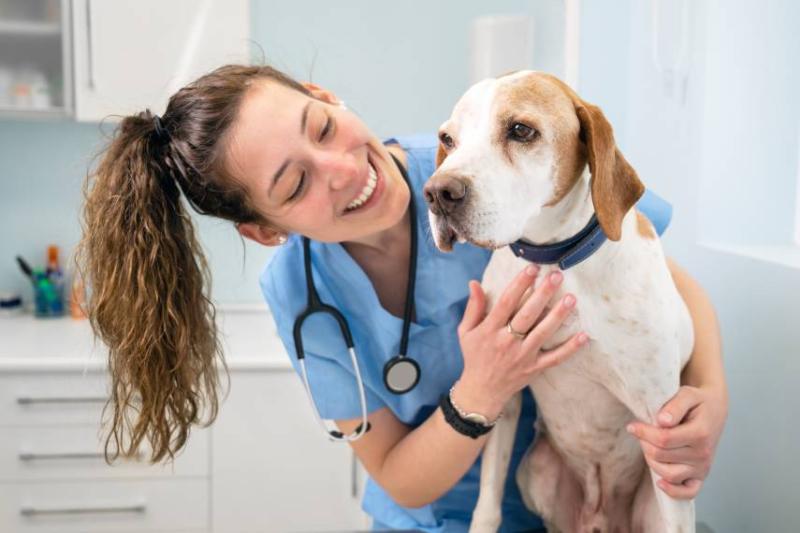
Keeping your furry friend in good health takes a lot of care, attention and – unfortunately – money. Taking out a pet insurance policy will cover you for various things which may go wrong, but not necessarily all of your veterinary bills.
While we can’t guarantee what your insurer will or probably won’t cover, the below is a general guide. If in doubt, contact your insurer.
What does pet insurance cover?
Pet insurance is intended to give you peace of mind if your pet becomes ill or is injured. We’ve broken down what vet bills a typical pet insurance policy will and won’t cover.
Does pet insurance cover routine visits?
All insurance policies tend to cover unexpected events, and pet insurance is no different. So, while you’re likely to be covered for accidents or illnesses, not all trips to the vet will be covered.
Your pet insurance policy won’t cover standard healthcare like annual health assessments or check-ups that often include routine maintenance procedures such as jabs or worming treatment.
Does pet insurance cover vet visits?
If you’re looking for help with vets’ bills, pet insurance policies tend to include a certain amount towards them as standard.
Lifetime Pet Insurance, you’ll get up to £10,000 of cover for vet fees. Likewise, our Extra Time-Limited Pet Insurance provides up to £4,000 of vet fee cover.
You should be covered for your cat or dog’s diagnosis and resulting treatments. This could include:
- consultations with your vet
- examinations, including X-rays, MRI and CT scans
- medication
- surgery
- alternative therapies for your pet provided they're recommended by a vet
- dental treatment resulting from an accident
What doesn’t pet insurance usually cover?
Pet insurance policies vary, so some may cover certain procedures that others don’t.
Most policies typically won’t cover the following:
- grooming
- bathing
- nail clipping*
- defleaing
- deworming
- vaccinations
- spaying or neutering
- microchipping (if you own a dog, you're unlikely to get pet insurance if they're not microchipped)
However, always check your policy document to see what’s covered and what isn’t.
*Some vets might agree to cut your pet’s nails as part of another procedure if you ask. They may also offer if your pet is put under anaesthetic. Although it won’t be covered under most types of pet insurance, it may be less expensive as it’s alongside other treatment.
Am I covered if I have a vet healthcare plan?
No. Healthcare plans are not a substitute for insurance.
Pet insurance tends to cover unexpected events, so you're likely to be covered for accidents or illnesses, and they usually include a certain amount of vet fees. This could include consultations with a vet, medication, surgery and examinations including X-rays, MRI and CT scans.
Healthcare plans provide vaccinations, pest treatments and health checks. They may also offer discounts on vet care and medication but won’t cover for accidents or illnesses.
How much does pet treatment cost without insurance?
The below figures are indicative, based on what we've paid out for some of the most common vet treatments at the end of 2023. However, it's important to remember that prices vary around the UK.
| Condition (most to least common) | Treatment cost and range | Potential treatment |
|---|---|---|
| Gastrointestinal issues | £43-£6,269 | Consultation/exam, medication and specialist treatment |
| Skin wounds/infections | £45-£3,738 | Skin tear, sedation, stitches, cleaning infections, testing, medication and monitoring |
| Lameness | £120-£8,263 | Consultation, medication, full general anaesthetic, cruciate ligament surgery and aftercare |
| Lumps and bumps | £65-£9,930 | Fatty lump removal, chemotherapy, surgery |
| Accidental poisoning/ingestion of toxic substances | £183-£2,646 | Consultation, medication, hospital stays, and testing |
| Eye issues | £26-£3,200 | Medication, general anaesthetic and third-eyelid surgery |
| Ear infections | £31-£823 | Consultation, medication, full sedation, procedures and laboratory tests |
| Foreign Body causing intestinal obstruction | £102-£570 | Initial consult and medication, exploratory surgery |
How much do vet appointments cost?
This really depends on the veterinary practice, but visits almost always incur a fee – even if it’s just a short examination. A consultation fee might cost between £30 and £300 depending on location and time. It’s likely to cost more on a weekend or bank holiday, for example.
Costs can vary wildly depending on the type of treatment required and the type of pet you have. Typically, treatments for dogs cost more than equivalent procedures for cats.
According to data from the ABI, pet insurance payouts were more than £1 billion in 2022, 17% higher than the previous year.
Do insurers pay vet bills directly?
They can, but it depends on whether your vet agrees to be paid directly. This is usually the easiest way to settle bills for all concerned.
However, vets usually prefer payment upfront, meaning you’ll probably need to pay upfront and claim the cost back from your insurers.
Can I see a vet for free?
There’s no NHS equivalent for our furry companions. This means that healthcare for pets will usually cost money.
There are other ways of getting help for your pet’s health. If you take out a pet insurance policy with us, you’ll get 24-hour professional veterinary advice at no extra cost thanks to our partnership with PawSquad.
Without needing to pay extra, our customers can get:
- advice from a vet who’s registered with the Royal College of Veterinary Surgeons, with clinical experience of at least five years
- no-rush consultations via phone, video or Messaging
- follow-ups on your pet’s health, and any treatment plans available
Also, some charities such as PDSA offer some free pet treatments if you receive Housing Benefit, Council Tax support or Universal Credit with a housing element. You also need to live within the catchment of one of its pet hospitals.


